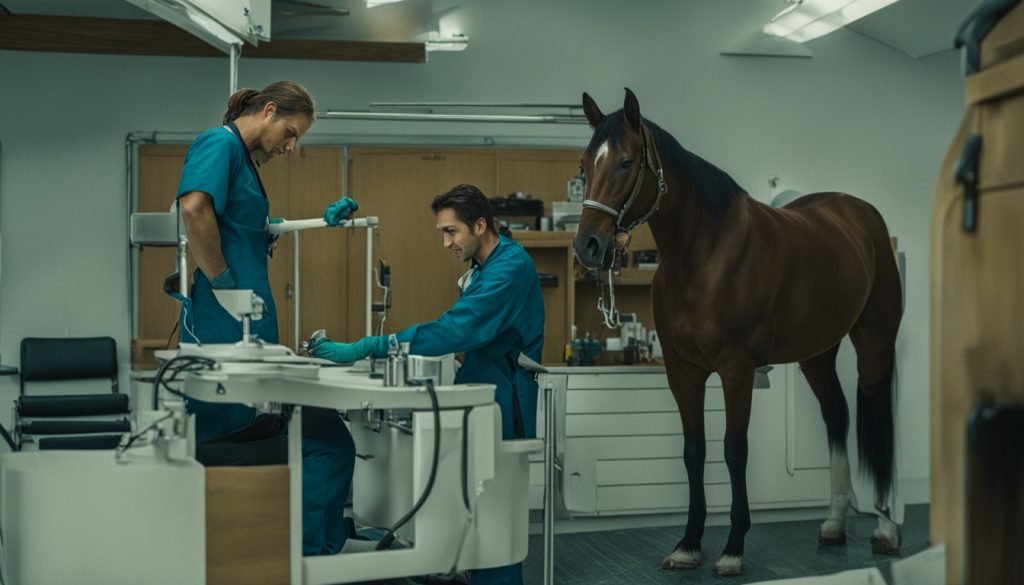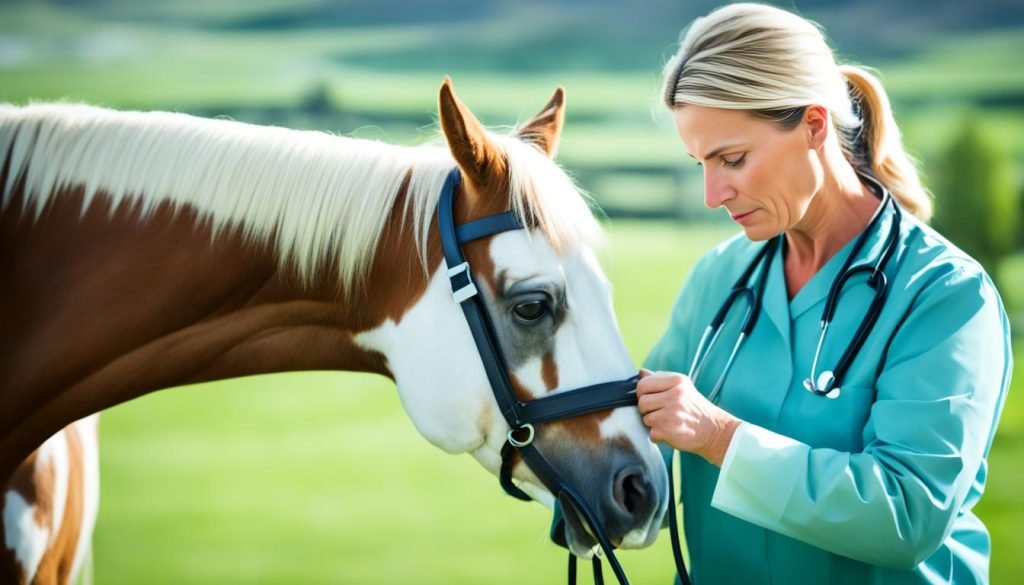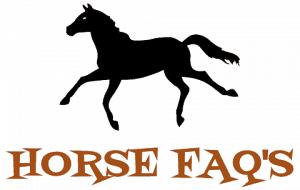Did you know that over 80% of equine health problems can be detected early through regular veterinary visits? At practices like Red Hills Veterinary Hospital, twice-yearly check-ups are essential in promoting horse wellness and preventing minor issues from escalating into significant health concerns. These visits are a cornerstone of preventive care, integrating vaccinations, parasite prevention, and proper nutrition, providing a holistic approach to your horse’s well-being.
Routine veterinary visits also allow horse owners to address critical questions about weight management and nutritional needs, further enhancing the benefits of regular oversight. This proactive approach underscores the importance of these check-ups as part of a comprehensive strategy to maintain equine health and happiness.
Key Takeaways
- Regular vet check-ups can detect over 80% of equine health issues early.
- Twice-yearly exams are standard for integrating preventive care elements.
- Check-ups include vaccinations, parasite prevention, and nutritional guidance.
- These visits allow for early intervention, preventing minor issues from escalating.
- Routine veterinary care is essential for maintaining overall horse wellness.
Understanding the Importance of Equine Health
The importance of equine health cannot be overstated. Effective equine health management requires a proactive approach and meticulous attention to detail. Integrating preventive care methods into your horse’s routine can make a substantial difference in their overall well-being.
The Role of Preventive Care in Equine Health
Preventive care is foundational to maintaining your horse’s health. Experts from Red Hills Veterinary Hospital and Platinum Performance emphasize that routine examinations are crucial in identifying and addressing health issues before they escalate. These wellness exams do not just look for current issues but aim to prevent future problems, allowing for a sustained and optimal health outlook.
How Regular Vet Visits Contribute to Overall Horse Wellness
Regular vet visits play an essential role in equine health management. Frequent checkups facilitate consistent monitoring, creating opportunities to catch subtle changes that might signify early signs of health issues. This proactive approach allows for immediate management of any concerns, preventing them from developing into significant health problems. Moreover, these routine examinations can include discussions about nutrition, weight management, and other aspects crucial to your horse’s overall wellness.
What to Expect During a Routine Examination
Ensuring your horse’s health through routine examinations involves a comprehensive range of veterinary tests and physical assessments. These routine checks are pivotal in maintaining overall horse health, providing owners with peace of mind.

The Components of a Thorough Physical Exam
During a routine examination, veterinarians meticulously evaluate various physical exam components. These include observing the horse’s behavior and using weight tapes to estimate their weight accurately. The Body Condition Score (BCS) system also plays a crucial role by assessing the horse’s overall body condition. Additionally, key vital signs such as temperature and heart rate are diligently monitored.
Common Tests and Procedures Included
Standard veterinary tests during checkups often involve a comprehensive inspection of the horse’s coat to detect any dermatological issues, conducting dental exams to determine the need for floating, and evaluating leg and foot health. Other common procedures include fecal sampling, deworming treatments, and administering vaccinations. Each of these components contributes significantly to a thorough horse health assessment, ensuring potential issues are identified and managed promptly.
| Examination Component | Description |
|---|---|
| Behavior Evaluation | Observes the horse’s demeanor and activity level to identify any abnormalities. |
| Weight Estimation | Uses weight tapes to estimate and monitor the horse’s weight. |
| Body Condition Score | Assessing the overall condition and fat coverage of the horse. |
| Vital Signs Check | Includes checking temperature, heart rate, and respiration rate. |
| Coat Inspection | Examining the horse’s coat for signs of health issues or parasites. |
| Dental Checkup | Evaluates the teeth, including the need for dental floating. |
| Leg and Foot Health | Assesses hoof condition and leg integrity to ensure soundness. |
| Fecal Sampling | Performed to identify internal parasites. |
| Deworming | Treatments administered based on fecal sampling results. |
| Vaccinations | Administered based on the horse’s age, health, and regional needs. |
Overall, each aspect of these physical exam components and veterinary tests is crucial in ensuring a comprehensive horse health assessment, enabling early detection and proactive management of any health concerns.
Early Detection of Potential Health Issues
Maintaining equine health is essential for ensuring that your horse leads a productive and vibrant life. One of the most effective strategies for managing equine health issues is early detection through consistent and thorough vet visits. By catching minor problems in horses at an early stage, you can prevent these issues from escalating into severe and more costly health concerns.
Spotting Minor Problems Before They Worsen
Early detection is the key to managing equine health efficiently. During scheduled vet visits, detailed assessments such as body condition scoring and monitoring of heart and lung sounds are vital. These evaluations allow for the observance of minor problems in horses that, if left unchecked, could lead to more severe conditions. Identifying these issues early can help in taking timely preventive health care measures.
Proactive Approach to Preventative Health Care
A proactive approach to preventive health care includes routine bloodwork, regular dental checkups, and constant monitoring of physical and behavioral changes. According to Dr. Durham of Platinum Performance, routine bloodwork can reveal early indications of diseases like kidney disease long before clinical symptoms arise. Integrating preventive health care into your horse’s routine ensures that equine health issues are identified and managed promptly.
The Benefits of Regular Vet Check-Ups for Your Horse
Regular veterinary check-ups are essential to ensure the well-being of your horse. These check-ups focus on achieving optimal performance and extending horse longevity through tailored wellness packages that address various aspects of their health.

Ensuring Optimal Performance and Longevity
One of the primary goals of regular vet visits is to ensure your horse reaches its optimal performance level. Evaluations of the musculoskeletal condition are critical for this purpose, as they identify any need for dietary supplements or specific treatments. Addressing these needs early on not only improves current performance but also significantly contributes to horse longevity.
Improving Quality of Life and Comfort
Another benefit of consistent veterinary care is the enhancement of your horse’s overall quality of life and comfort. Routine check-ups include assessments of nutrition, dental care, and hoof care. These aspects are crucial for maintaining overall health and protecting your horse from the elements, ultimately leading to a higher quality of life.
Special Considerations for Different Life Stages
Equine care varies significantly based on the life stage of the horse, making it essential to adopt tailored strategies that address the unique needs of foals, young horses, adults, and seniors. Each stage comes with its own set of challenges and preventive care requirements, ensuring optimal health and wellness throughout the horse’s life.
Care for Foals and Young Horses
Foal care involves more frequent veterinary visits to monitor proper development and promptly address any congenital issues. Young horse health can be safeguarded through early vaccinations, routine dental checks, and initial training assessments that lay the groundwork for a robust and healthy lifecycle. Frequent fecal exams and a balanced diet are also crucial during these formative years to prevent common issues such as gastrointestinal parasites.
Maintaining Health in Adult and Senior Horses
As horses transition into adulthood, maintaining health revolves around consistent care that supports their active lifestyle. Adult horse maintenance includes regular evaluations of physical fitness, dental health, and joint condition to ensure ongoing high performance. For senior equine care, the focus shifts to monitoring for age-related conditions such as Equine Metabolic Syndrome and Cushing’s Disease. More frequent bloodwork and a detailed medical history review become indispensable to catch early signs of these conditions and adjust care protocols accordingly.
Understanding and addressing the specific needs at each life stage not only enhances the overall well-being of the horse but also ensures a higher quality of life and longevity. Tailoring veterinary care to suit foals, young horses, adults, and seniors maximizes their potential and keeps them healthy and vibrant throughout their lives.
FAQ
Why are regular vet check-ups important for equine health?
Regular vet check-ups are essential for equine health as they help in early detection of potential health issues, maintaining overall wellness, and creating a preventive care strategy. With twice-yearly visits being the standard, these check-ups include thorough assessments and tests like vaccinations and deworming to catch minor issues before they escalate.
What role does preventive care play in equine health?
Preventive care is crucial in equine health management as it focuses on early detection and prevention of potential health problems. Regular vet visits enable a proactive approach, allowing for timely interventions that can prevent minor issues from developing into major conditions.
How do regular veterinary visits contribute to overall horse wellness?
Regular veterinary visits contribute to horse wellness by offering comprehensive check-ups that monitor vital signs, nutritional needs, and general health conditions. This consistent monitoring helps in maintaining optimal health and performance, ensuring long-term wellness.
What should I expect during a routine examination for my horse?
During a routine examination, a veterinarian will usually conduct a thorough inspection including checking vital signs like temperature and heart rate, evaluating weight and body condition, and examining the horse’s coat, teeth, and hooves. Additional tests such as fecal sampling and blood work may also be included.
What are common tests and procedures done during routine vet visits?
Common tests and procedures during routine vet visits include fecal exams for parasite detection, dental checks for potential floating, vaccinations, deworming, and bloodwork for early disease detection. Each of these procedures is integral to maintaining your horse’s overall health.
How does early detection of health issues benefit my horse?
Early detection of health issues allows for immediate intervention, preventing minor problems from escalating into serious conditions. This is a cornerstone of preventive health care, ensuring your horse remains healthy and addressing any concerns at an early stage.
What is a proactive approach to equine health?
A proactive approach to equine health involves regular veterinary check-ups, routine examinations, and consistent monitoring for any changes in health. This approach focuses on preventing health issues before they arise and ensures long-term well-being for your horse.
How can regular vet check-ups ensure optimal performance and longevity for my horse?
Regular vet check-ups help ensure optimal performance and longevity by monitoring the horse’s musculoskeletal condition, identifying the need for supplements or treatments, and addressing any nutritional or dental care needs. These comprehensive examinations maintain the horse’s physical condition, which is vital for their athletic performance and longevity.
How do routine veterinary visits improve my horse’s quality of life and comfort?
Routine veterinary visits improve your horse’s quality of life and comfort by addressing essential care areas such as nutrition, dental health, and hoof care. This regular oversight ensures that your horse stays healthy and comfortable, ultimately contributing to their overall well-being.
What special considerations are there for foals and young horses?
Foals and young horses may require more frequent veterinary visits to monitor their development and identify any congenital issues early. These visits help ensure proper growth and set the foundation for a healthy life.
How do I maintain the health of my adult and senior horses?
Maintaining the health of adult and senior horses involves regular check-ups, routine bloodwork, and careful monitoring for age-related conditions like Equine Metabolic Syndrome and Cushing’s Disease. This ensures timely interventions and adjustments to care strategies, keeping them healthy at every life stage.
